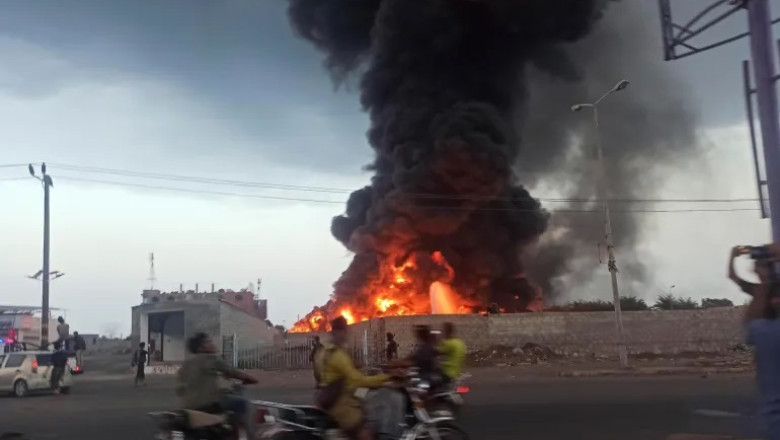
views
Iran Condemns Israeli Airstrikes on Fuel Tanks and Power Plant in Yemen’s Hodeidah Port, Accuses U.S. of Complicity
On Monday, September 30, 2024, Iran’s Foreign Ministry strongly condemned Israel for launching airstrikes on fuel tanks and a power plant in the strategic port city of Hodeidah, Yemen. The airstrikes, which have significantly disrupted critical infrastructure in the war-torn country, have drawn sharp criticism from Tehran, which also accused the United States of complicity in what it called Israeli “crimes” and warned of potentially dangerous consequences for the region.
Iranian Condemnation and Accusations
The spokesperson for Iran’s Foreign Ministry, Nasser Kanaani, issued a statement condemning the Israeli airstrikes, characterizing them as a violation of international law and an escalation in the conflict that threatens to destabilize the already volatile region further. In his remarks, Kanaani said, “The Israeli attacks on fuel tanks and a power plant in Hodeidah represent a dangerous escalation, targeting vital civilian infrastructure that will have serious humanitarian repercussions for the Yemeni people.”
Kanaani's criticism did not stop at Israel. He also accused the United States of being complicit in the airstrikes, stating, “The U.S. is a complicit partner in these Israeli crimes and bears full responsibility for the dangerous and unpredictable consequences of these attacks.” The spokesperson elaborated that the U.S. government’s continued support for Israel, including military aid and diplomatic backing, emboldened Israeli aggression across the region.
Context of the Airstrikes
Hodeidah, Yemen's principal port on the Red Sea, is a key lifeline for the country, which has been embroiled in a protracted civil war since 2015. The port is responsible for receiving around 70% of Yemen's imports, including food, fuel, and humanitarian aid. Over the years, control of the port has shifted between different factions, including the Iranian-backed Houthi rebels, who have controlled much of northern Yemen, including the capital Sanaa.
Israeli airstrikes in Yemen have been rare, but the recent attacks on the power plant and fuel tanks in Hodeidah signal an intensification of Israel’s involvement in the regional conflict. While Israel has not officially commented on the strikes, its alleged targeting of Houthi positions aligns with its broader strategy of countering Iranian influence in the region. The Houthis, backed by Iran, are seen by Israel and its allies as a key extension of Iran’s military footprint in the Middle East, and their control over critical infrastructure like Hodeidah poses a strategic concern.
Broader Implications
The Israeli strikes on Yemen come amid heightened tensions across the Middle East, with multiple conflicts intersecting in Syria, Iraq, and Yemen, where Iranian-backed forces and Israel have been engaged in a shadow war for influence and control. Israel has repeatedly targeted Iranian proxies and infrastructure in Syria and Iraq, but the airstrikes in Yemen mark a notable escalation in the conflict, potentially drawing more actors into direct confrontations.
Iran, as the primary supporter of the Houthis, views any attack on Houthi-controlled areas as a direct threat to its interests in the region. The Houthis have been a key ally for Iran in its regional struggle against Saudi Arabia and Israel, and any weakening of their control over strategic assets like Hodeidah could reduce Iran's leverage in the conflict.
By accusing the U.S. of complicity, Iran’s Foreign Ministry has sought to frame the airstrikes as part of a broader U.S.-Israeli strategy to destabilize the region and diminish Iranian influence. The statement warned that the continued support of Israeli military actions by the U.S. could lead to "dangerous and unpredictable" consequences, further destabilizing an already volatile region and potentially leading to more widespread conflict.
Humanitarian Concerns
The airstrikes in Hodeidah, particularly the targeting of fuel tanks and a power plant, have exacerbated an already dire humanitarian situation in Yemen. The country has been facing one of the worst humanitarian crises in the world, with millions of people at risk of famine, disease, and violence. Attacks on civilian infrastructure only compound these challenges, as they disrupt the distribution of essential goods like food, medicine, and fuel.
International humanitarian organizations have called for an immediate cessation of hostilities and the protection of civilian infrastructure to prevent further suffering. The destruction of fuel tanks in Hodeidah could lead to widespread shortages, hampering efforts to deliver aid and leaving millions without electricity or access to clean water.
International Reactions
While Iran’s condemnation was swift, international reactions to the airstrikes have varied. Some Western powers, including the European Union, have expressed concern over the escalation of violence in Yemen and have called for restraint from all parties involved. The United Nations has also issued a statement urging both Israel and Iran to avoid further provocations that could lead to a broader regional conflict.
The U.S. government has not officially responded to Iran’s accusations, but its ongoing support for Israel’s military actions, including intelligence sharing and defense coordination, has been a point of contention for Iran and its allies.
As the situation continues to unfold, the airstrikes in Hodeidah represent yet another flashpoint in the complex and interconnected web of conflicts in the Middle East, where local wars are often influenced by broader geopolitical rivalries. The international community’s response, as well as potential retaliation from Iran or the Houthis, will be critical in determining whether this latest incident leads to a deeper escalation or a return to diplomacy.












Comments
0 comment